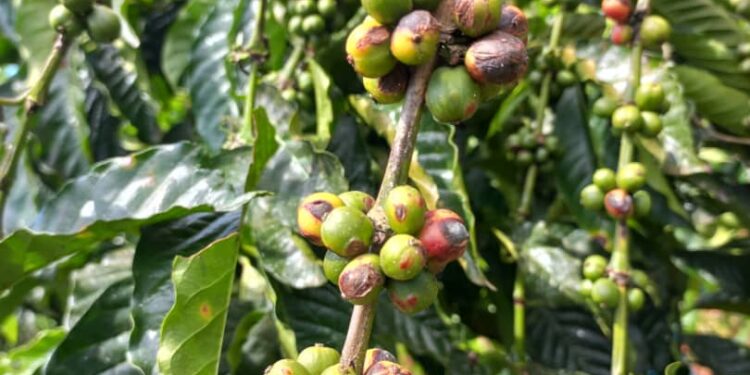Uganda could face an imminent ban by the European Union (EU) on the exportation of its coffee to EU countries due to a stringent prohibition on the import of ‘deforestation-related products.’
With approximately 150 days remaining before the EU enforces this nerve-wracking ban, Uganda is in a desperate scramble to comply in order to avoid the suffocation of its economic lifeline: revenue from coffee exports.
Farmers, exporters, and regulators are facing mounting anxiety over meeting the new documentation requirements essential for exporting to the EU market. This particularly impacts Uganda’s coffee and cocoa sectors.
Dr. Gerald Kyalo, the Director of Development Services at Uganda Coffee Development Authority (UCDA), emphasized the urgency at a recent meeting in Kampala.
“Time is running out to comply with the new documentation needed to be allowed to export to the EU market,” he stated.
The required documents include detailed land-use maps to verify deforestation-free production post-December 31, 2020, compliance with local legislation, and a due-diligence statement covering the entire coffee supply chain with minimal risk of non-compliance.
“If you are, for example, buying coffee from farmers in Kasese, you must have a list of those farmers and you must show their GPS coordinates,” Kyalo explained. This is to ensure traceability and verify deforestation-free practices.
Stringent New Regulations
The regulations, encapsulated in Regulation (EU) 2023/1115, aim to curb global deforestation, reduce greenhouse gas emissions, and protect biodiversity. They were approved by the European Parliament on December 5, 2022, and went into effect on June 29, 2023.
Players in the sector were given an 18-month grace period to implement the new rules, with smaller enterprises receiving 24 months. The first grace period ends on December 31, 2024.
Kyalo elaborated on the compliance requirements: “The due-diligence statement must contain origin details, including geolocation data for all plots, with different formats for various plot sizes.” If a farmer is found to have contributed coffee from deforested land, penalties include fines and the destruction of the coffee consignment at the importer’s cost.
Coffee is Uganda’s principal cash crop, bringing in nearly $1 billion annually. Approximately 60-75% of Uganda’s coffee is shipped to EU member states, making the EU the primary market for Ugandan coffee. Other affected commodities include beef, wood, cocoa, soy, palm oil, rubber, and products derived from them such as chocolate and furniture.
At a stakeholder meeting organized by the Uganda chapter of the Southern and Eastern Africa Trade Information and Negotiations Institute (SEATINI) on July 11, the scale of the challenge was clear. Uganda currently lacks a national database of coffee farmers, although conservative estimates suggest there are about two million coffee farmers nationwide.
Kyalo highlighted the necessity of creating a national Value Chain Actors (VCA) register as a precursor to a national traceability system aligned with EUDR requirements. “This register will assign unique identifiers and geo-locations to all coffee farmers,” he said.
Failure to comply could see European buyers ceasing to issue forward contracts to Ugandan exporters from July 2024.
Varied Reactions and Concerns
Reactions in Uganda have been mixed. Janet Nabukwasi, a coffee farmer from Mbale District, expressed concern about farmers’ awareness: “How are we supposed to handle this EUDR when we don’t even know what is in the Coffee Act?”
Christine Kaaya, the Kiboga Woman MP, warned that the new database could be misinterpreted as a taxation tool, potentially driving farmers away from the sector.
Richard Okot, Assistant Commissioner of External Trade at the Ministry of Trade, Industry, and Cooperatives, stressed the importance of in-country value addition. “For how long are we going to rely on export of raw coffee when we can actually earn more by adding value?” he asked.
Edward Mukiibi, president of Slow Food Uganda, criticized the government for not providing adequate funding for a rapid traceability mapping exercise.
However, Joyce Brenda Kisingiri, Acting Principal Inspector at the Department of Crop Inspection and Certification, reassured attendees that the government has experience in drawing up compliance mechanisms.
As the December 2024 deadline approaches, the collaboration between government bodies, industry players, and farmers will be crucial in securing Uganda’s position in the lucrative EU market.
Do you have a story in your community or an opinion to share with us: Email us at editorial@watchdoguganda.com










